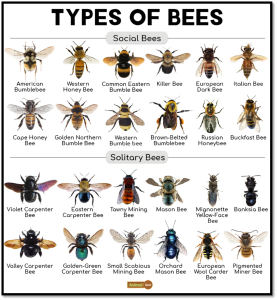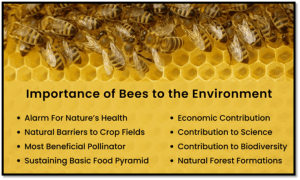What’s the Buzz?
Why World Bee Day Deserves Your Attention
By Alyssa Jairam

Every May 20th, the world pauses to honor some of the planet’s hardest-working creatures: bees. From pollinating crops to supporting biodiversity, bees are essential to our survival. On World Bee Day, we celebrate their contributions, raise awareness about the challenges they face, and explore what we can do to protect them.
What is World Bee Day?

World Bee Day commemorates the birth of Anton Janša (1734–1773), a Slovenian beekeeping pioneer. He transformed modern apiculture through innovative hive designs and scientific education. In 2017, the United Nations declared May 20th as World Bee Day, to highlight the essential role of pollinators in ecosystems, agriculture, and food security.
Source: https://www.gov.si/en/news/2020-12-22-pioneers-of-slovenian-beekeeping/
Why World Bee Day Matters
World Bee Day isn’t just about honey—it’s a global call to action. Bees and other pollinators are under threat from human activity, yet they are vital to the health of our planet.
The goals of World Bee Day include:
Promoting pollinator conservation
Encouraging sustainable agricultural practices
Supporting biodiversity and ecosystem health
Empowering beekeepers and rural communities
Bee-Lieve the Numbers: Global Pollination Stats
The impact of bees on global food systems is enormous:
75% of global food crops rely on animal pollinators like bees (FAO, 2023)
Bees contribute between US$235–577 billion to annual global food production (UNEP, 2022)
There are over 20,000 bee species worldwide, but many are in decline
About 40% of pollinator species, especially bees and butterflies, face extinction (IPBES, 2021)
Types of Bees: Who’s Who in the Hive
Understanding bee behavior helps us protect them more effectively.
Social Bees
Live in colonies
Include honeybees and bumblebees
Feature a queen, workers, and drones
Solitary Bees
Nest alone
Raise offspring without colony support
Equally effective pollinators!

Buzzing in the Caribbean: Bees in Trinidad & Tobago
Trinidad and Tobago is home to a vibrant and productive bee population:
Approximately 60 native bee species, including stingless bees
Over 30,000kg of honey produced annually—mostly from Africanized bees
Around 500 registered and 150 independent beekeepers
Local honey generates an estimated TT$100 million annually
Beekeepers also harvest wax, propolis, and royal jelly
30% of bee colonies are affected by pesticide exposure
Why Are Bees So Important?
Bees are more than honey-makers—they’re crucial to environmental health, food security, and the global economy.

Source: https://www.earthreminder.com/why-are-bees-important-to-the-environment/
Here’s why bees matter:
Pollination: Essential for 75% of flowering plants
Food Production: Improve yields and crop quality
Biodiversity: Sustain plant and animal life
Ecosystem Resilience: Maintain natural balance
Agricultural Value: Contribute billions worldwide
Livelihoods: Support jobs in rural communities
Natural Medicines: Source of healing products like honey and propolis
Environmental Indicators: Reflect the health of ecosystems
Wildlife Support: Help feed birds, mammals, and insects
Food Security: Crucial for global nutrition
Threats Facing Bee Populations
Despite their value, bees face serious risks—mostly due to human activity:
Pesticides: Chemicals like neonicotinoids harm bees’ health
Habitat Loss: Urban sprawl and monoculture agriculture reduce food and nesting sites
Climate Change: Alters flowering times and disrupts pollinator behaviors
Diseases & Parasites: Including Nosema and Varroa mites, which devastate hives
How You Can Help Save the Bees
You don’t have to be a beekeeper to make a difference. Here are 5 simple ways to help protect pollinators:
Plant Bee-Friendly Gardens: Choose native flowers that provide nectar and pollen
Avoid Harmful Chemicals: Skip synthetic pesticides and herbicides
Provide Water: Place shallow water bowls with pebbles for bees to land on
Support Local Beekeepers: Buy local honey and bee products
Spread the Word: Share what you learn about bees with your friends, family, and online community
🌟 Final Buzz: Protecting Bees is Protecting Ourselves
Bees may be small, but their impact is colossal. They pollinate our crops, support natural ecosystems, and play a key role in global food production. Yet they face extinction if we don’t act now.
This World Bee Day, commit to making a change. Whether it’s planting wildflowers, buying local honey, or educating others—every action counts.
Let’s ensure that bees—and all the benefits they bring—continue to thrive for generations to come.
References
- Apiculture Society of Trinidad and Tobago. 2023. “Annual Report on Beekeeping in T&T.”
- Caribbean Pollinator Initiative. 2022. “Native Bees in the Caribbean: A Regional Survey.”
- 2023. “The Importance of Bees in Food Security.” Retrieved from Food and Agriculture Organization of the United Nations.
- 2021. “Assessment Report on Pollinators, Pollination and Food Production.”
- Joseph, Sydney. 2024. “Beekeepers Abuzz Over Proposed Regulations.” Retrieved from Newsday.co.tt.
- 2022. “Pollinators: Vital to Our Food Supply.”
- University of the West Indies (UWI). 2024. “Pollinator Research Programme Reports.”
Want to learn more about how Kenson Group is promoting a greener environment? Discover some of the key activities through our Carbon Net Zero Capability Portfolio here: https://kenson.co.tt/kcnzcp/
